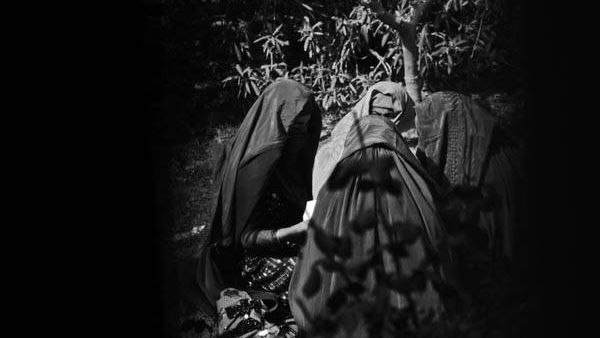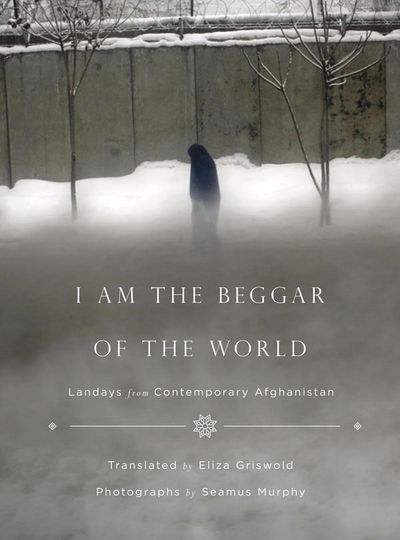Unveiled: How an Ancient Poetry Tradition Gives Afghan Women a Voice
'They sound like lullabies a lot of the time. But they bite.'

It's not often that we're privy to the inner lives of women in Afghanistan. I Am the Beggar of the World, a fantastic compilation of photography and poetry from contemporary Afghanistan, aims to change that. In 2012, journalist and poet Eliza Griswold traveled around Afghanistan with photographer Seamus Murphy in search of landays: short anonymous poems, passed down orally through generations of Pashtun (the country's majority ethnic group), that speak the collective concerns of the culture's women. At turns bawdy, baiting, lyrical, and moving, "these poems belie the notion that an Afghan woman is a sort of mute ghost beneath the blue burka," Griswold explained to me over the phone. A condensed and edited version of our conversation is below.
Julia Felsenthal: First off, how would you define a landay?
Eliza Griswold: A landay is a folk poem that belongs to an oral and anonymous tradition. It functions like rap music; it can change over time to reflect what a woman—or a man, but mostly a woman—is going through. One example is: whereas a poem might have [once] been about occupation by the British, now it's about occupation by the Americans…They're twenty-two syllables long, and two lines…They're about five traditional subjects: war, love, separation, grief, and homeland—all of which are central to Pashtun identity. They're thousands of years old, and no one's quite sure where they come from.
JF: How did landays first come onto your radar?
EG: Through the photographer Seamus Murphy, with whom I wrote the book. He gave me [a collection of landays] called Songs of Love and War by Sayd Majrouh. We both have for a long time been wanting to work on a project that reflects the dark humor of Afghan daily life, beyond what the news cycle reflects. Knowing that, and knowing that poetry was a popular form that people actually used in daily life to express the challenges of their existence, I started looking around for what kind of story might reflect that…I googled the word "landay" one day and up popped this story of a young woman who had killed herself because she wasn't allowed to write poetry. Her name was Rahila Muska, and she had been a member of a women's literary circle. She'd been an anonymous member, and she'd actually given them a pseudonym, but she called in to read her poetry aloud because it was the only form of school she was allowed to attend….One day she had called from a hospital bed telling them that she'd set herself on fire and that she was going to die. Armed with just this scrap of a story and the connection of knowing this women's literary group in the capital of Kabul, Seamus and I set out to see if we could find Rahila Muska's story in rural Helmand, which is one of the places where war has been most violent over the past fourteen years….We did find her family…All her poems had been lost—we were told that her father actually burned her manuscript—but what he couldn't kill was a landay. One survived her that she used to repeat all the time that goes: I call. You're stone. One day you'll look and find I'm gone. The reason that couldn't be killed is because it exists in the common culture. She didn't own that landay, but that's the one she felt closest to, and for that reason, it survived her.
JF: So landays give women in Afghanistan a voice they might otherwise not have?
EG: What the poems do that's probably most interesting to an outside reader, is they absolutely explode any notion that an Afghan woman, underneath her blue burka, is submissive. [That] either she doesn't understand what's happening to her, or she condones it in any way. These are poems of protest. They're full of rage. They're funny as hell. What they do for me is really force me to reckon with the humanity of Afghan women…It's not like, oh well, they're married as young children, but what do they know the difference? It's like: You sold me to an old goat, father. May God destroy your home; I was your daughter. I think that kind of says it don't you?
Get exclusive access to fashion and beauty trends, hot-off-the-press celebrity news, and more.
JF: How did you typically discover new landays?
EG: Sitting around with a group of women in a refugee camp, talking to them about their lives and what their struggles are, asking them about how they expressed them and then going into a conversation about the poems themselves…There was such a clandestine piece of this. Visiting women at home, in some cases...had to be done in secret. So women asked that I'd come to their house in a burka, at certain times…[It] wasn't just talking to a westerner: it was talking to a westerner about these poems, about what it was to be a Pashtun, that was threatening…It's a closed culture.
JF: And how do landays enter the culture?
EG: They come out of women and men sitting around and singing to each other at weddings, different cultural events, and so they're changed over time by human experience.
JF: How have they adapted with technology?
EG: They're thriving. This is what was surprising to me. They're popular. They've very much entered in the world of Facebook. Not Twitter so much, but people will SMS each other landays.
JF: Do you have a favorite landay? One that's moved you particularly?
EG: There's so many that are my favorites for different reasons. But I think probably my favorite one linguistically is: When sisters get together, they're always praising their brothers. When brothers get together, they're selling their sisters to others...That one really worked…They sound like lullabies a lot of the time. But they bite. So that's the kind of wonderful juxtaposition of how they sound versus what they mean.
IAm the Beggar of the World: Landays from Contemporary Afghanistan, translated and presented by Eliza Griswold with photographs by Seamus Murphy, is out today from Farrar, Straus and Giroux.
